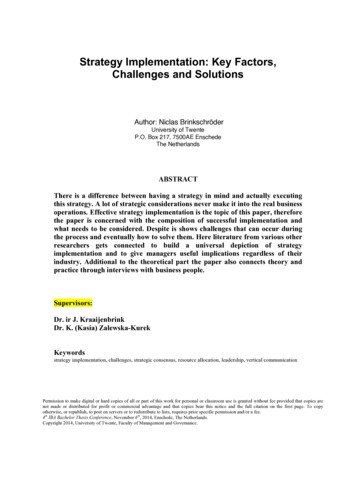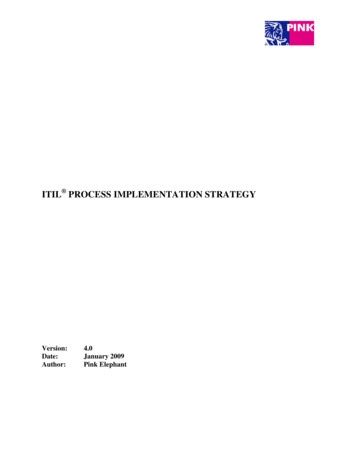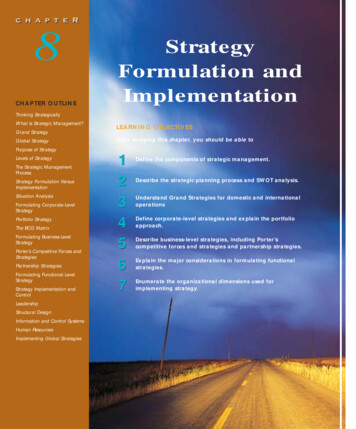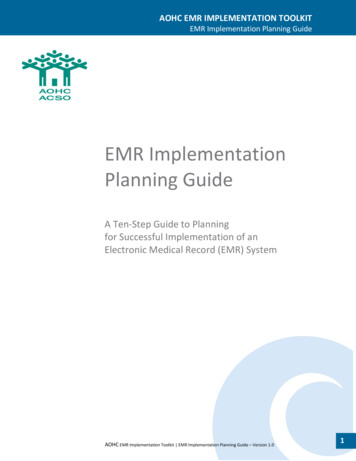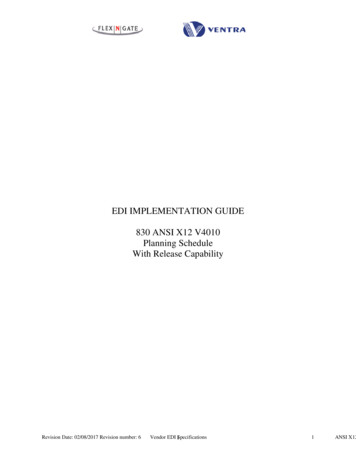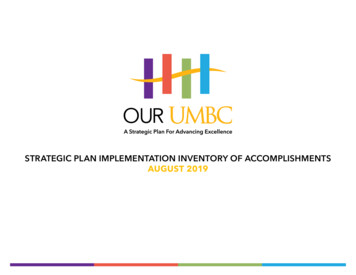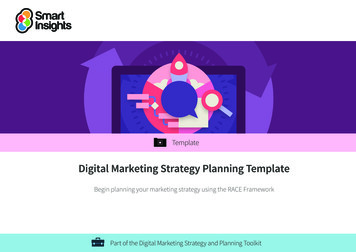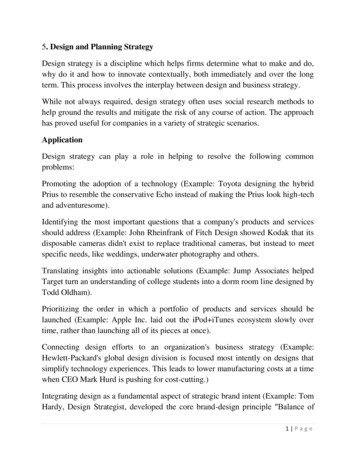
Transcription
FAILING TO PLAN ISLIKE PLANNING TO FAILBusiness planning& strategyimplementation
“We have sold over 4.5m Raspberry Pis and could nothave achieved this without Martin’s help with strategy andbusiness planning”Eben Upton, CEO, Raspberry Pi
Failing to plan is like planning to failExecutive summaryWithout a comprehensive, up-to-date business plan and animplementation timetable, companies may be missing out onopportunities for growth and not realizing their full potential. A formalplan can be an extremely valuable tool for managing and growinga business, as it allows a company to recognize its strengths andweaknesses. Furthermore, research has shown that SMBs that havea business plan in place are consistently more profitable than thosewho do not have a business plan.HighlightsThe benefits of creating a business planThe key elements of an implementation timetableHow a part-time CFO can help you to create a business planand implementation timetable for your businessBusiness planning & strategy implementation3
Failing to plan is like planning to failIntroductionPlanning is the key to the success of any business, no matter itssize or age but many small to medium-sized businesses don’thave a plan of any kind.1The majority of those without such a plan whichsets out the company’s strategic direction, its mainoperating and financial targets, the actions it willtake to achieve those objectives, the new initiativesand investments planned, and their impact on thecompany’s performance say they don’t believe it’snecessary. Nearly a fifth say they prefer to keepplans in their head, according to research byClose Brothers Asset Finance.Mike Randall, CEO of Close Brothers Asset Finance,says, “It’s concerning that so many small and mediumsized firms do not have a business plan. Without cleardirection, they may be missing out on opportunities forgrowth and not realizing their full potential.”2The study also asked those who did have a plan, howoften they reviewed it. Almost two-fifths said theyconsidered it at least once a year while a fifth said theylooked over their plan every two years. Some 14%reassessed it once every two to five years. Randall saidthis was an area SMBs should be focusing on as, “aplan is only useful if it is reviewed regularly to ensureit meets the current and future needs of the business.”He added: “It’s vital business owners regularly reviewtheir financial strategy to ensure they have the rightfunding in place to meet the needs of their business,at its current stage of the business lifecycle.”He suggested that those who weren’t prioritizing itor “didn’t feel it was necessary” should rethink theirapproach.“Planning is key to any business throughout its lifecycle.A formal plan can be an extremely valuable tool formanaging and growing a business, as it allows a companyto recognize its strengths and weaknesses.”‘Worrying number of SMBs don’t have a business plan’, BusinessMatters magazine, www.bmmagazine.co.uk, May 1, 20152‘ Are business plans redundant? Nearly a third of British SMEs don’t use them’,Smith, Rebecca, Real Business, www.realbusiness.co.uk, May 1, 201514Business planning & strategy implementationIt’s concerningthat so many smalland medium-sizedfirms do not have abusiness plan.
Failing to plan is like planning to fail“A lack of a succession plancan put the future successof a business at risk.Rebecca McNeil, MD for Business Lending and Enterprise atBarclays, says, “A lack of a succession plan can put the futuresuccess of a business at risk, so this needs to be consideredfar earlier and more formally than the results show.”Having a business plan is fundamental, she says. “It definesexactly what you want to achieve, how you plan to achieveit across a set time period and is a sure-fire way to ensurethat growth targets and plans are being met.”“Business plans are dynamic documents – meaningthey should be revisited and adjusted as the businessdevelops. In addition, a strong plan can help applicationsfor finance from a business loan to alternative forms offinance and investment.”She continued; “Importantly, when a business is in trouble,having a solid plan can help to steer it back to good health.”SMBs that had a business plan in place last yearwere consistently more profitable (70%) than thosethat did not (52%), according to yet another survey,this one commissioned by business and financesoftware provider Exact.3It showed that those who had a business plan in placewere more than twice as successful in achieving thesegoals than those who did not (achieving a 69% successrate versus 31%).Creating a well thought-through, comprehensive businessplan is an arduous task. Thinking through objectives andlikely outcomes which may occur many years down the lineis, by nature, challenging. But it is the hard work up frontwhich makes for lighter work down the road as all of ourteam of part-time CFOs will attest to.Most CEOs and General Managers simply don’t havethe time to spend on quality strategic thinking and todocument and communicate that thinking in a waywhich allows the whole business to buy into the vision.Harder still is managing and implementing thebusiness plan. Significant strategic course correctionsare commonplace in fast-growing companies. Theseshould be embraced. The tricky part though is in managingregular change. That requires a combination of timeand specialist knowledge.3‘UK SMBs losing out on nearly 20% extra profit by not having business plan’,Exact, www.exact.com, Apr 10, 2014Business planning & strategy implementation5
Failing to plan is like planning to failThere is an art and science to effective business planning andgetting it right brings a real sense of clarity and direction to abusiness – this is where an experienced part-time CFO canmake a significant contribution.Not spending quality time on strategic planning usuallyleads to a chaotic working environment. Our clientsoften talk about ‘not feeling in control’ and ‘not reallyknowing what is coming around the next corner’.When the plan is weak, business owners tend to operatewithout the same sense of conviction as those whoallocate time and expertise to the planning process.Our part-time CFOs often find their clients have donesome good planning and strategic thinking but need adevil’s advocate to ask the right questions and help tosteer the ship in the right direction.Being a CEO or General Manager without a high level‘finance person’ to bounce ideas off can be tough.CFOs often possess a different albeit complementary setof skills to CEOs/General Managers.It is natural for business owners to bring people into thecompany who see the world in the same way they do. Itis often more valuable to have key members of your teamwho possess very different skills to your own. Constantlydoing the same things in the same way with the samepeople will usually lead to achieving the same results.If you are worried about whether you have the right teamin place to fulfil the vision you have for your business, or6Business planning & strategy implementationwhether you have the funds you require, or whether yourbusiness plan is sufficient to reach your objectives, then wewould recommend you take the time out to work throughthe detail. It is rare to see a company succeed if it doesn’thave a robust plan.Our part-time CFOs often work with clients who startedoff with intentions to run a business and have ended upworking in a job. However, with the right business plan inplace and a robust implementation approach, the businessowner is able to run the business without getting drawntoo far into the day-to-day details.Our part-time CFOs often workwith clients who started offwith intentions to run abusiness and have endedup working in a job.
Failing to plan is like planning to failThe benefits of creatinga business plan andimplementation timetableProper business planning is very liberating for the businessowner, whatever their objective might be. A well-constructedand regularly reviewed business plan will instill real confidencethat the goal is indeed achievable.Writing a business plan has many benefits for businessesof any size and in any industry. It can help owners andsenior managers to:Clarify objectives and develop suitable strategies.They can create a clear path for management to followin the early stages and identify targets for performancemeasurement (or ‘milestones’), says David Cromwell,former head of JP Morgan & Co’s Private Equity andVenture Capital Division and co-director of Yale Schoolof Management’s Entrepreneurial Business PlanningCourse.4“Research forces companies to learn what they canexpect to make and what the industry trends are.Where has the industry been the last five years, andwhere is it going? If the research indicates your idea isviable, the actual construction of your plan depends onthe goods or services you offer, how much funding youneed and your goals.”Identify and overcome internal and external threatsOrganize the companyUnderstand the market. You have to research yourmarket to understand it and that will always bebeneficial.“Research is one of the big value-adds of writing abusiness plan,” says Joseph Ferriolo, Directorof Wise Business Plans.545‘The Business Plan: Lecture 3:1’, Cromwell, David, David Cromwell’s and MaureenBurke’s Entrepreneurial Business Planning course, Yale School of Management‘How to Write a Business Plan: Outline, Format & Sections’, Arline, Katherine,Business News Daily www.businessnewsdaily.com, Feb 5, 2015Business planning & strategy implementation7
Access external funding (banks,venture capitalists, and angelinvestors are unlikely to look atany funding request that isn’taccompanied by a very solidbusiness plan.)Running head here xxx“A professional investor’s decision to pursue aproposed new opportunity will turn on the quality ofthe business plan and the accompanying materials,”says Cromwell.“There is no chance whatsoever of raising the neededfinancing without a business plan. Even with a plan,the content and packaging must be excellent.”“The business plan is management’s first, best, andprobably only chance to capture the attention ofinvestors,” he adds. Investors need assurance thatmanagement has thought of its corporate goals,management team, products, strategies,competition, and the necessity of capital.They also want to know that the management teamhas considered weaknesses as well as strengths,problems as well as opportunities.“At JPMorgan & Co., we received over 4,000 businessplans every year,” recalls Cromwell. “We invested onlyin about 1% of the incoming situations.” That ‘dealflow’ versus the rate of investment is typical forventure capital investors, he says.“Venture investors think they are busy people. Insteadof trying to find a reason to pursue a new investmentopportunity, most VCs try to find a reason to kill it ASAP.”“There is no chance whatsoeverof raising the needed financingwithout a business plan. Evenwith a plan, the content andpackaging must be excellent.8Business Planning & Strategy Implementation
Failing to plan is like planning to failThe key elementsof a business planThe most important part of your business plan isits financial information. Your financial forecastsshould include your cash flow predictions forthe next 12 months or more.You also need to describe:Your business’ historyIts competenciesYou’ll also need to provide monthly sales estimates andcosts to prove the business has enough working capitalor to show that you understand you need to arrangeadditional finance.Key products/servicesGoalsMarketManagementYou need to explain all assumptions in the business plan,with best- and worst-case scenarios. Detail the risksyou’re likely to face and how they will be dealt with.Your objectives and business-developmentstrategy (how you plan to achieve yourobjectives)Detail the risksyou’re likely to faceand how they will bedealt with.Business planning & strategy implementation9
Failing to plan is like planning to failThe Business Plan SectionsExecutive SummaryMarketing and salesThe executive summary is usually the first sectionof any business plan and provides a condensedoverview of what the business is and how you intendto reach your goals.You need to detail your marketing strategy (includingpricing, promotion) and your sales strategy (includingsales forecasts, programs and techniques). Your costs,services, and support will also need to be includedin this section.If you’re seeking funding, you should detail the termsof the financing and the amount needed.Company descriptionThis section outlines what you expect your business toachieve financially over the next three to five years. Itneeds to include your projected financial statements,expected cash flow and break-even analysis as well askey financial indicators and ratios.This is like an extended elevator pitch. You need toexplain your company history, business goals and howyou satisfy the needs or wants of your market. You willalso need to explain your competitive advantage.Don’t be tempted to overstate your numbers orexpectations to obtain financing. It’s likely to harmrather than help you get that funding.Market analysisFunding requestYou will also need to provide market analysis, sizeand expected growth as well as, industry participants,distribution patterns, competition and buying patterns,and your main competitors.If you plan to ask for a loan or capital, you need toinclude a formal funding request as part of your businessplan. You need to include details of how much moneyyou need now and how much you’ll need in the future.It’s best to leave writing this section until after you’vecompleted the rest. It should be less than 1400 words.Organization and managementIn this section, you need to detail your managementteam (and plans to fill any gaps within that team), yourorganizational structure, your Board of Directors, aswell as a personnel plan.Service or product lineYou need to describe your product or service and anyass
business plan is sufficient to reach your objectives, then we would recommend you take the time out to work through the detail. It is rare to see a company succeed if it doesn’t have a robust plan. Our part-time CFOs often work with clients who started off with intentions to run a business and have ended up . working in a job. However, with the right business plan in place and a robust .
